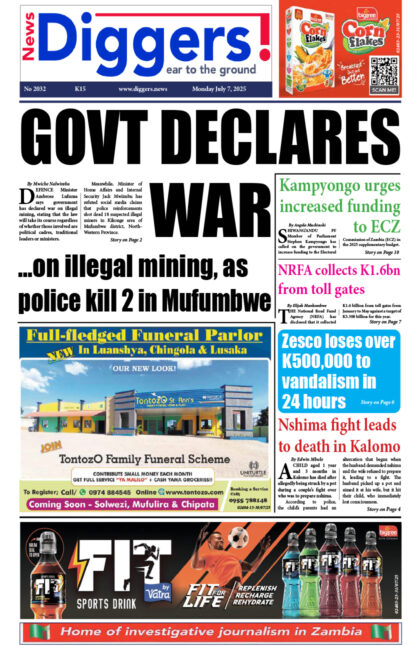Professor Oliver Saasa says the Ministry of Housing and Infrastructure Development commands an overbearing influence over the ultimate decisions regarding which road investment is pursued.
And Prof Saasa says many road projects in Zambia are procured and commenced without detailed designs resulting in bidders determining the cost independent of government, opening up opportunities for corruption.
In a statement dubbed: “Addressing the Challenges in Roads Construction and Maintenance Urgent for National Development,” Prof Saasa, the renowned economist, said the Ministry of Housing and Infrastructure Development commanded an overbearing influence over the ultimate decisions regarding which road investment was pursued.
He bemoaned the lack of independence the Road Development Agency is meant to have in the implementation of road projects and public infrastructure works due to political interference from its parent ministry.
“A perennial problem in Zambia relates to poor investment targeting, which rarely secures reasonable economic returns. While this assessment revealed that RDA has performed reasonably well, the Ministry of Housing and Infrastructure Development (MHID) appears to command an overbearing influence over the ultimate decisions regarding which road investment is pursued,” Prof Saasa stated in a press statement released yesterday.
“It has been revealed that although RDA usually assesses and then submits to MHID for approval a list of priority road projects, political considerations that rarely consider value for money take precedence in the final decisions.”
He stated that while the allocation of the roads budget would inevitably be politically-influenced, value for money ought to be factored into project selection given the fact that it was the Zambian taxpayer footing the bill.
“While it is inevitable that the allocation of the roads budget will be influenced by political considerations to some extent, there should still be significant consideration of value for money and efficiency considerations in the application of public resources,” Prof Saasa added.
Prof Saasa, an independent economic consultant who is chief executive of Lusaka-based Premier Consult Ltd, also noted the weak coordination between the RDA and the National Road Funds Agency (NRFA).
“There is also weak co-operation and coordination between RDA and NRFA. The consequences of this state of affairs have included focus on economically-unviable roads. It has also contributed to the monumental challenges at the level of progress monitoring. This is worsened by the fact that the government lacks rigorous asset management criteria for the assessment of the quality of the roads that are undergoing construction, maintenance and rehabilitation. In the light of these realities, institutional reforms are urgent,” he advised.
“The aim should be coming up with an alternative structure that places the private sector at the centre of the operationalisation of roads infrastructure development and whereby the government structures should remain lean and basically facilitative in both their mandates and orientations.”
And Prof Saasa observed that many road projects in Zambia are procured and commenced without detailed designs resulting in bidders determining the cost independently of government, opening up opportunities for corruption.
“Given the evident non-availability in a number of cases of detailed engineering road designs (which should include pavement and geometric designs, environmental management, drawings and estimated construction costs) before tendering and construction, opportunities for cost escalation have remained pervasive,” stated Prof Saasa.
“Yet, contrary to this requirement, many road projects in Zambia are procured and commenced without detailed designs. This has resulted in bidders generally determining the cost independently of government, a state of affairs that has triggered significant cost escalation, which, in turn, has opened opportunities for arbitrariness and corruption in price determination.”
According to Prof Saasa, the sentiments contained in the press statement derive from Premier Consult’s assessment of the roads infrastructure development in Zambia between March and April this year.
The assessment, which was conducted by Prof Saasa, with assistance from Chiwama Musonda, looked closely at resource allocative patterns within the road infrastructure sector; reviewed the institutional, regulatory and legislative environment within which road investment decisions are made and implemented, among others.



















